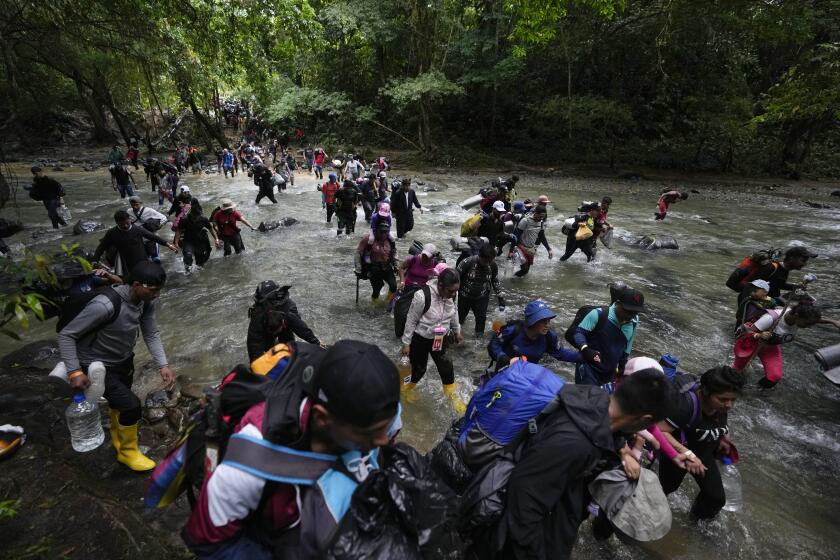The Plight of ‘Illegal Children’
It’s fall, and my husband and I have been encouraging -- no, coercing -- our children to walk to school. It’s good for them, but we worry about their safety. So we walk them the first two blocks, across the boulevard with the traffic light, and then they continue by themselves down three blocks of tree-lined streets.
I watch them shuffle along, the older one sometimes jabbing his little brother, and the younger with his shoes deliberately and stylishly untied. Untied shoelaces drive me crazy, but I know they are one of the few areas of autonomy these kids manage to carve away from the control of teachers and parents. For three blocks, they’re on their own.
The differences between the childhoods of suburban, middle-class children and those of the 48,000 youngsters from Central America and Mexico who go north illegally on their own every year are rooted in transformations brought about by immigration and globalization.
It’s no small irony that many of these children are riding trains north. Many of the railroad tracks were laid by U.S. agribusiness in its search for Mexican migrant farm workers. Labor recruiters went directly to the border to hook Mexican workers, and when that wasn’t enough, they went to the heart of central-western Mexico.
Between 1942 and 1964, the bracero program issued nearly 5 million labor contracts for Mexican men to work in the United States, mostly in agriculture. Many of these men got used to earning dollars, first in farm work and then in other jobs in cities and suburbs, so they stayed. Their U.S. employers got addicted to them, too, papers or no papers.
Meanwhile, the Mexican braceros’ wives didn’t like the long family separations, and soon these women sought to follow their husbands to the United States. Today, hundreds of thousands of Central American and Mexican immigrant women are living and working in the U.S., while their children remain in their countries of origin. Our labor demand for immigrant workers has expanded far beyond agriculture to just about every sector of the economy, including manufacturing, construction, retail and services.
Paid domestic work -- the work of cleaning other people’s houses and caring for other people’s children -- has grown tremendously, and in many places the job has entered the global marketplace. It’s practically institutionalized as an immigrant woman’s job. Caribbean, Indian and Filipina women who migrate for domestic jobs in other parts of the globe -- like their Mexican and Central American counterparts in the U.S. -- leave their families and children behind.
The mothers of these children become transnational mothers out of necessity. When they leave their toddlers in the care of grandmothers or aunts to come to the U.S., they’re doing so because they want the best for the kids. They’re not migrating in search of a good time but to buy their children milk, shoes and schooling. They suffer, as do their children, who feel abandoned.
Family migration dramas centered on gender have been replaced by generational struggles. Just as Mexican migrant wives sought to join their husbands, so too Central American and Mexican kids seek to join their mothers in the U.S.
This is globalization from below. It’s the legacy of the bracero program, the North American Free Trade Agreement, the Central American civil wars of the 1980s and our changing postindustrial economy. Rather than leading to equilibrium, globalization has intensified inequalities. Entire communities get shaken in these seismic shifts, and even children take on dangerous journeys to seek exploitative work in El Norte.
Perhaps we can begin to imagine and strive for childhood, with its promise of protection and affection, to become a human right. A new amnesty-legalization program, and labor and family policies that recognize we live in a global world, would go a long way to remedying the problems faced by these transnational families. Maybe then, “illegal child” will no longer be part of our vocabulary.
*
Pierrette Hondagneu-Sotelo is an associate professor of sociology at USC. Her most recent book is “Domestica: Cleaning and Caring in the Shadows of Affluence” (UC Press 2001).
More to Read
Start your day right
Sign up for Essential California for news, features and recommendations from the L.A. Times and beyond in your inbox six days a week.
You may occasionally receive promotional content from the Los Angeles Times.






